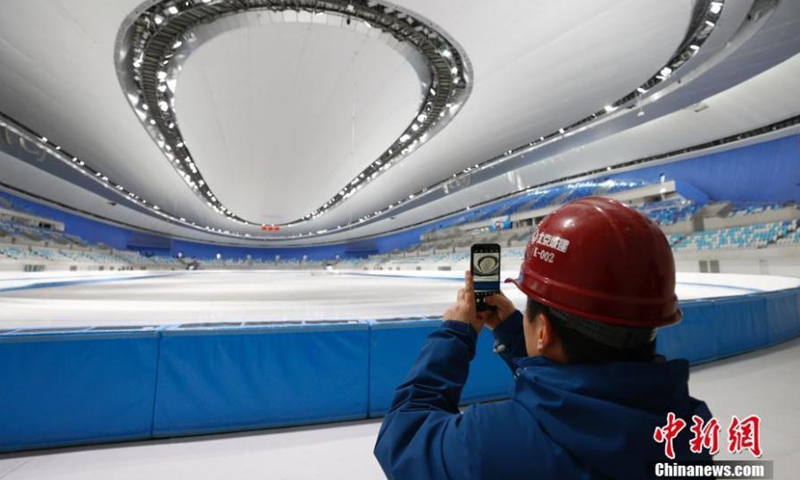
Photo shows a construction worker taking photos at the National Speed Skating Oval in Beijing, capital of China, Jan. 28, 2021. The ice-making work at the National Speed Skating Oval in Beijing, also known as the "Ice Ribbon", was completed, meaning the iconic venue for the 2022 Winter Olympics is now ready for test competitions.Photo:China News Service
In an email sent to the media Tuesday evening, the US State Department said that it was looking for a coordinated approach with its so-called partners and allies toward the participation in the upcoming 2022 Winter Olympics in Beijing. A spokesperson for the department added that the US "certainly [wishes] to discuss" a potential joint boycott with allies, according to Reuters.
While the US did not say outright that it would boycott the major sports event, the statement also offered no help in easing tensions surrounding the Winter Olympics amid rising calls in the West to skip the event over widely-debunked claims regarding Xinjiang-related affairs. Some are even speculating whether the 2022 Olympics would be the most heavily politicized Olympic Games since 1980 when 65 countries, led by the US, staged a boycott of the Moscow Olympics.
Though currently no country appears likely to issue any policy regarding a boycott of the 2022 Olympics, some anti-China forces have been relentlessly hyping up a boycott. Some Western politicians have proposed a series of ridiculous motions and ideas for skipping the event, including changing the venue, asking athletes not to attend the event, calling on media distributor NBC Universal not to air the games and pressuring businesses from sponsoring the event.
Needless to say, such calls have caused an unnecessary distraction for athletes who are preparing for the games. Such suggestions go against the Olympic spirit by depriving athletes of the opportunity to compete. Such an attempt to gain global publicity by taking advantage of the Olympics is misguided and will never succeed. As the previous mass boycott of the 1980 Olympics already shown, the IOC, athletes, and most governments around the world are not open to being held hostage by such a politically motivated boycott.
Beyond the potential impact on the sports world, the radical calls are also causing burden on global businesses, which could result in heavy economic losses. Olympic sponsors, including Coca-Cola, Visa, General Electric and other multinational corporations, which count on the Winter Olympics to gain greater market share in the massive Chinese market, are now caught in the crossfire.
According to media reports, some anti-China forces have started harassing these sponsors "one by one". Last month, a public letter asked Airbnb CEO Brian Chesky to withdraw its Olympic sponsorship or risk reputational damage. A similar letter has also been reportedly sent to Mars Wrigley CEO Grant Reid.
As these Western forces try to use Xinjiang-related affairs to further intensify the division and confrontation between China and the West, they create huge risks to economic and trade cooperation as well as foreign companies' businesses in China. Some have already warned that if Western companies bow to the pressure and decide to boycott the Beijing Olympics, they could face serious consequences in the Chinese market.
The recent widespread backlash from the Chinese public faced by some foreign brands for their decision to boycott cotton produced in Northwest China's Xinjiang Autonomous Region over lies such as "forced labor" is a case in point for such risks.
With more than 10 months to go before the 2022 Olympics, anti-China forces will likely continue their boycott plot with endless slandering and smearing. But responsible countries and companies should keep sober and not to be carried away. Politicizing sports and commercial cooperation will only lead to ruinous consequences for all.




